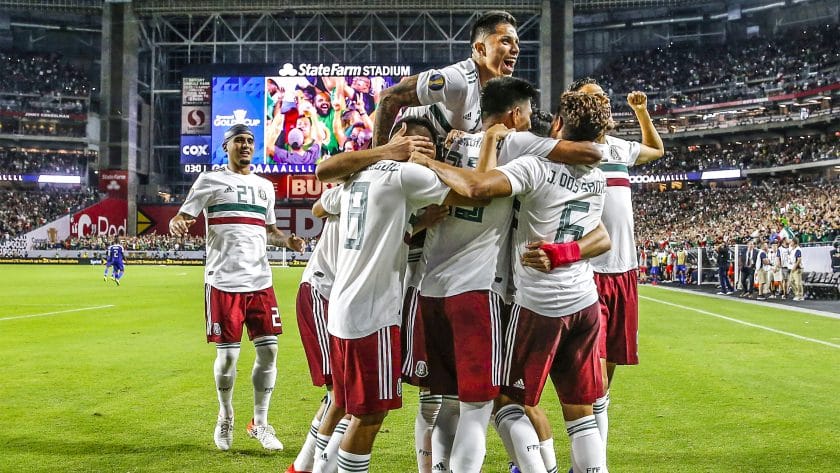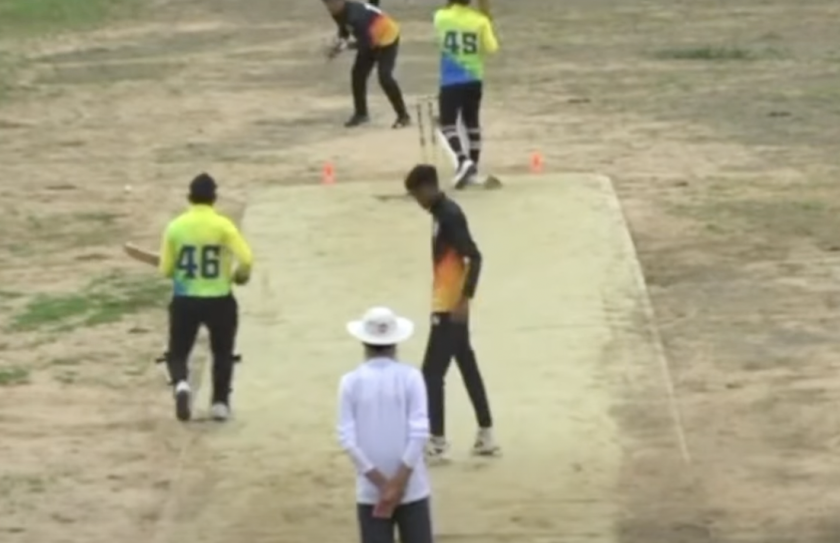Did CONCACAF really orchestrate a U.S. vs. Mexico Gold Cup final?

Many soccer fans are claiming that the CONCACAF used the referees to orchestrate a money-grabbing United States vs. Mexico final.
[sc name=”Onz Chery Banner” ]Many soccer fans might try to go on Netflix to watch the Gold Cup this Sunday. Why Netflix? A load of people is stating that the CONCACAF scripted a United States vs. Mexico final—with the help of the referees—because it will bring them the most revenue.
Es la final que mas dinero 💰💰💰💰💰💰💰les da, por eso anoche le ayudaron a México con un penal inexistente
— Juan Pueblo🇸🇻 (@drcastillo67) July 4, 2019
Translation: “It’s the final that gives them more money, that’s why, last night, they helped Mexico with a non-existent penalty.”
That's what you guys planned since the beginning
— Stanlee (@Tantann1) July 4, 2019
And it’s not just the fans. Mexican sports journalist Andre Marin also expressed that CONCACAF planned a U.S. vs. Mexico final.
“[…] only because you [Haiti] don’t ‘generate’ the same money as Mexico in the final, today they stabbed you and removed you from the tournament,” Marin posted on his Facebook page on July 2nd.
Mexico did win their semifinal with a controversial PK against the hard-working Cinderella of the tournament, Haiti. And back in 2015, they also won their quarter-final and semi-final via disputable PKs.
This makes it easy to say that something is in the air in favor of El Tri; nevertheless, that’s a serious accusation to make, one without a tiny bit of proof.
Let’s go back to 2006 when Italian side Juventus was relegated to Serie B for match-fixing. You can easily say Juve did match-fixing. Why? They had proof: phone calls.
In Mexico versus Haiti, we have nothing out in the open. Referees make mistakes all the time in the World Cup, in the Copa America, in the UEFA Champions League, in La Liga, in the Sunday League by your house. A refereeing’s false call doesn’t necessarily mean a tournament is rigged.
But it could mean just that, too.
Just because there aren’t any proofs doesn’t mean the fans aren’t right. Should we give them the benefit of the doubt? Well, all we can do is examine the situation.
For starters, plenty of fans mentioned that U.S.A. and Mexico have been in the final year in and out, which led them to the conclusion that the Gold Cup is rigged.
That's why we ❌❌❌ delete Haïti!!!
Business…
Every Gold Cup always the same Final..
No challenge..You make the Game ugly
— Deblozay Lakay TV (@DeblozayLakay) July 4, 2019
Do the USMNT and El Tri always face each other in the final?
It does feel like it but, really, last time the two countries met in the final was in 2011. The U.S. beat Jamaica in the 2017 Gold Cup final. In the previous final, Mexico got the best out of Jamaica in 2015. In 2013, U.S.A. defeated Panama in the championship match.
USMNT and Mexico played each other in the final for three straight times in 2007, 2009 and the 2011 Gold Cup. And one of these two countries won that tournament in the last eight years. It does sound a bit iffy.
But if you think about it, U.S.A. and Mexico are considered the two best teams in the competition. It somewhat makes sense for them to always win the Gold Cup and meet each other in the final for three straight years.
One thing that’s questionable is that since after 1991, the inaugural edition of the cup, U.S.A. and Mexico have always ended up being on opposite sides of the bracket hence could only meet each other in the final.
What are the odds of two teams to only be able to play each other in the final for 14 straight editions of a competition? Soccer fans on social media have a case.
Now let’s jump to the elephant in the room: Mexico’s penalty versus Haiti. Haitian defender Jems Geffrard rested his hand on Raul Jimenez’s back in the 92nd-minute while Herve Bazile raised his boot high but only made minimum contact with Jimenez.
Jimenez dropped himself on the turf, the referee, Abdulrahman Al-Jassim called for a penalty. Al-Jassim was just a couple yards away from the play. You can’t really assume why he didn’t make the obvious call.
It could’ve been an honest mistake. It could’ve been because a Haitian woman stood him up once. Or as plenty people claim, it could’ve been because CONCACAF told him to.
But think about it … if you’re a referee who’s in favor of Mexico, why in the world would you allow the game to go to extra-time when anything can happen? He would’ve made a false call since the regular 90 minutes, no?
Furthermore, Mexico was the victim of a false-penalty in their semi-final against Costa Rica. Costa Rica forward Joel Campbell was sprinting toward El Tri’s goal, Luis Rodriguez hit the ball from behind Campbell outside the penalty area. The Costa Rican midfielder made most of it as he fell and rolled in the box.
The referee, John Pitti, whistled for a penalty. There are two obvious reasons why it shouldn’t have been a PK, Rodriguez tackled Campbell outside the box and he got all ball.
Later in the third minute of extra time, referee Pitti gave Mexico’s coach Gerardo Martino a yellow card for arguing with the fourth official. As a result, Martino was banned from the sideline in his side’s semi-final versus Les Grenadiers.
If you’re a referee the league told to help Mexico reach the final and you call a false penalty against them and give their head coach a yellow card that kept him out of the sideline in his team’s next match, you’re not doing a good job.
Meanwhile, the Yanks downed Jamaica, 3-1, in the other semi-final fair and square.
Now going back to the previous two Gold Cups. The only time there was a significant disputable call in a U.S. knockout match it was against them.
It was in the Americans’ 2015 Gold Cup semi-final versus the Reggae Boyz when keeper Brad Guzan conceded a free-kick for throwing the ball just past the 18-yard box. It was a good call, but it was one of those calls most referees wouldn’t make. Jamaica scored the free-kick and defeated the U.S., 2-1.
As for Mexico, as noted, they won two knockout matches via disputable PKs in 2015. Toward the end of extra-time of their quarter-final versus Costa Rica, Oribe Peralta dived when Roy Miller slightly made contact with him.
Peralta did play it well, it wasn’t easy for the referee to make the right call in live action.
The referee pointed to the spot. Andres Guardado converted the penalty to give his country a 1-0 win.
In El Tri’s next match against Panama, they were losing, 1-0, then in the 89th-minute, Panamanian defender Roman Torres’ elbow touched the ball as he fell on the turf inside the box. The referee granted Mexico another questionable PK. Some referees would give a penalty, others wouldn’t. It was a tough call to make.
Penalty or no penalty, Guardado converted from the spot again to tie it up.
It wasn’t over, Mexico was rewarded another penalty. This one, it was obvious that it wasn’t a penalty. Javier Orozco fell as soon as he felt a little body contact from Adolfo Machado and Harold Cummings.
Guardado netted the penalty again. Mexico won 2-1 to reach the final.
Are the Mexicans just good at tricking referees? Or have the referees been on their side even though a critical call went against them versus Costa Rica this year? We’ll leave it to you to make that assumption.
[sc name=”Generic Link Next” link=”https://elitesportsny.com/2019/07/02/best-case-gold-cup-final-scenario-for-new-york-red-bulls/” text=”The Best Gold Cup Final Scenario For The New York Red Bulls” ]Originally from Haiti, Ralph 'Onz' Chery started his writing career as a City College of New York student with The Campus. He also wrote for First Touch, the Cosmopolitan Soccer League and other local leagues. After graduating, Onz started covering the New York Red Bulls for ESNY and joined Haitian Times.





